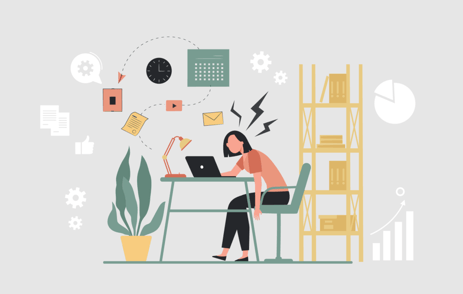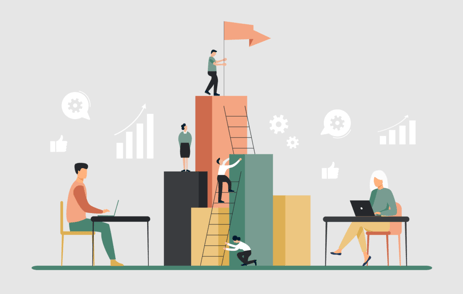When the pandemic hit and lockdowns sent the majority of us to our home offices (or kitchen tables), how did that disrupt the lines between work and home life? Did you find it more difficult to log out at the end of the day? Did you continue checking your emails after-hours because it was ever-present on your phone?
In a candid conversation, association industry veterans Shameka Jennings, Nikki Golden and Cindy Simpson shared how the pandemic rocked their senses of work-life balance, and what they’ve done to restore and maintain it.
Setting boundaries
When the lines between work and play become blurred, it’s important to build and reinforce boundaries in your own way.
For Golden, setting boundaries looks like closing the door to her office at the end of the day. She’s built structure by adopting a morning workout routine and starting her day with exercise to clear her head and get focused. She eats lunch downstairs, away from her office, or goes for a walk during lunchtime. She also keeps email apps off her phone, which helps her tune out the demands of work during her personal time.
Jennings said another way she sets boundaries for herself is by blocking time off herself on her calendar. For example, if she starts working at 8 a.m., she would reserve time until 10 a.m. before scheduling meetings.
The importance of boundaries was demonstrated early in her career, Jennings said, when she watched a colleague work late hours every day. One day, her colleague left work on time and was penalized the next day. Because everyone around her was so accustomed to her working late, they thought she was skipping work by leaving at a normal time.
At Simpson’s organization, her executive director implemented early days on Fridays, allowing the staff to clock out at 3 p.m.
“You don’t realize how much those extra hours really matter,” she said.
The importance of remote connection
Simpson, Golden and Jennings all leaned into remote connection through book clubs, professional groups and connecting with colleagues during the pandemic.
Simpson and Golden both have weekly check-ins with their colleagues to touch base on not only work matters, but how they’re doing mentally and in their personal lives as well.
“It’s interesting how much that normal salutation of ‘how are you doing?’ has taken on so much more of a loaded meaning this past year,” Golden said. “Everybody is answering that with a different level of honesty than they used to.”
Golden said being honest about outside struggles and concerns creates a deeper sense of connectedness and closeness among colleagues, and drives stronger levels of empathy because you understand each other better.
In the wake of the George Floyd murder, Jennings created a Slack channel for staff members of color in her organization. The channel gave Black co-workers a place to discuss their thoughts and feelings in a safe space, thus creating a bond Jennings said she never knew she would be able to have with her staff.
A change in perspective
For many, the pandemic urged forth a shift in priorities and perspective.
“Nobody has ever said they wanted to work more when they’re at the end of their life. … For me, I’ve really taken that personally, and I really thought about where my life is headed during this next phase of my life, and where I want to go,” Simpson said.
Simpson said because she is at the stage of her life where she’s no longer climbing the career ladder, she’s had to reassess what’s important to her, and how to define herself differently from what she does.
Jennings said she has often defined herself by her work, but the pandemic pushed her to slow down and spend more time taking care of herself.
“You are kind of like a house, and you need to take care of yourself. You can’t give your bricks away when you’re building your foundation,” Jennings said. “That’s something that really resonated with me, especially when I heard it during the pandemic, because life is sacred.”
Golden said the pandemic made her realize that mental breaks and self-care are absolute necessities. Work-life balance is hard when you’re used to putting 150% of yourself into work, she said.
“Sometimes 90% is really good, and not feeling bad about the fact that you can only give that 90% because you need to keep that 10%, or extra 40%, to yourself to build yourself up again, energy-wise. That’s been a great realization — that you can’t support others if you’re not able to support yourself,” Golden said.
After all, you have to put on your oxygen mask first before helping others in the plane.
“There’s a finite amount of time in a day, so you have to be careful in terms of how you structure that,” Simpson said.

June 16, 2021


